Género e inclusión
El género, la edad, las capacidades y otras características individuales o específicas del contexto presentan diferentes oportunidades y retos para proporcionar PTM a las personas en crisis de forma digna.
Los agentes humanitarios reconocen cada vez más las necesidades y limitaciones específicas de las personas con capacidades diferentes, las personas mayores, las personas de distinto sexo, en particular las mujeres, y las personas en movimiento. Paralelamente, se aprecia cada vez más la necesidad de adoptar medidas adaptadas y sensibles que garanticen su inclusión efectiva.
Apoyar las necesidades de las diversas personas con PTM va más allá de convertirlas en un grupo objetivo; se trata de un compromiso significativo, un diseño y una implementación intencionados, y un ajuste del programa para satisfacer las necesidades de los diferentes grupos con dignidad. Los enfoques inclusivos van de la mano de la ayuda centrada en las personas.
Prioridades actuales
La CALP Network seguirá animando a los actores de los programas de transferencias monetarias a que amplíen su enfoque para ser más inclusivos y defiendan una comprensión más completa de cómo los PTM pueden ir más allá de la noción de “no hacer daño” para abordar adecuadamente las necesidades de personas diversas de manera segura y digna.
Trabajaremos para elevar las experiencias e iniciativas sobre PTM y género, PTM inclusivos de la discapacidad, trabajando con diferentes etnias e identidades culturales, grupos minoritarios, personas con diversas identidades sexuales y grupos de edad.
CALP también se esforzará por hacer su trabajo lo más accesible posible.
Contenido destacado

La CALP Network & CARE: Módulo sobre los Programas de Transferencias Monetarias (PTM) y Género
Blog Post
Este video ofrece una visión general de la relación entre el género y los programas de transferencias monetarias (PTM) estructurada en torno al ciclo del proyecto humanitario, que incluye: Evaluación y análisis de la respuesta: cómo ajustar los procesos de evaluación para lograr un reflejo más preciso del género y los mercados. Diseño y ejecución: cómo utilizar métodos y...

Presentación: Módulo sobre Programas de Transferencias Monetarias (PTM) y Género
Presentación
Esta presentación de diapositivas es parte del primer vídeo de micro aprendizaje de CALP Network en español, realizado en colaboración con CARE. Este módulo de micro aprendizaje ofrece un panorama general de la relación entre el género y los Programas de Transferencias Monetarias (PTM) organizado en torno al ciclo de proyecto humanitario, y forma parte del curso en línea en español de...
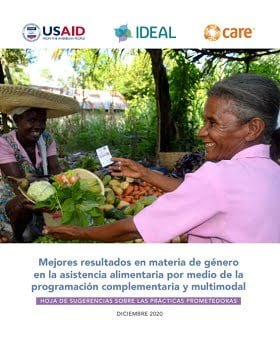
Mejores resultados en materia de género en la asistencia alimentaria por medio de la programación complementaria y multimodal: hoja de sugerencias sobre las prácticas prometedoras
Guía y herramientas
Esta hoja de sugerencias es un extracto del informe de investigación «Mejores resultados en materia de género en la asistencia alimentaria por medio de la programación complementaria y multimodal». Con el estudio, se intentó responder a la pregunta «¿De qué manera los procesos de diseño, implementación y supervisión de proyectos mediante el uso de modalidades combinadas mejoran los...
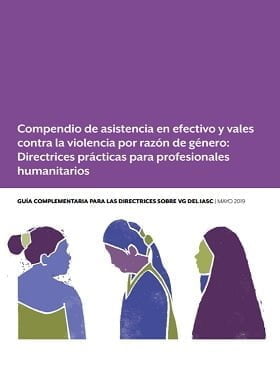
Compendio de asistencia en efectivo y vales contra la violencia por razón de género: Directrices prácticas para profesionales humanitarios
Guía y herramientas
El propósito de este compendio de asistencia en efectivo y vales (AEV) y violencia por razón de género (VG) es ayudar a los actores humanitarios y a las comunidades afectadas por crisis y violencia a: integrar la mitigación de riesgos de VG en las intervenciones AEV; integrar la prevención de VG en la programación multisectorial usando AEV cuando corresponda; integrar la AEV en la...

Programación de Transferencias Monetarias Que Funciona Para Mujeres: 6 Lecciones del Terreno
Informe
En la actualidad, la Programación de Transferencias Monetarías que funciona para mujeres (PTM) es una herramienta común entre las acciones humanitarias y se usa para satisfacer las diversas necesidades de las personas desplazadas por crisis y conflictos con mayor dignidad.1 Aunque existe evidencia cada vez mayor sobre el efecto de la PTM en el bienestar y el poder de las mujeres2, en la...
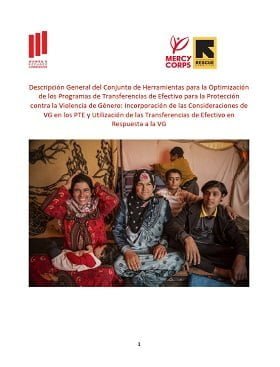
Conjunto de Herramientas para la Optimización de los Programas de Transferencias de Efectivo para la Protección contra la Violencia de Género
Guía y herramientas
De 2016 a 2018, la Comisión de Mujeres Refugiadas (WRC) emprendió un proyecto para desarrollar la capacidad que los actores humanitarios tienen para integrar la protección en los Programas de Transferencias de Efectivo (PTE) y para utilizar los PTE para los resultados de protección, específicamente la protección contra la Violencia de Género (VG). El proyecto, “Optimización de los...
Últimos recursos

Cash & Voucher Assistance (CVA) & Child Protection (CP) Global Study – Research Report in the DRC, Egypt, Lithuania and the Philippines
Report
Since 2022, Save the Children has been scaling up its use of CVA for Child Protection (CP) programming through various pilot projects.
Research was commissioned in four countries in 2022-23 to generate evidence and learning to inform the design of future programming but also to design a robust...
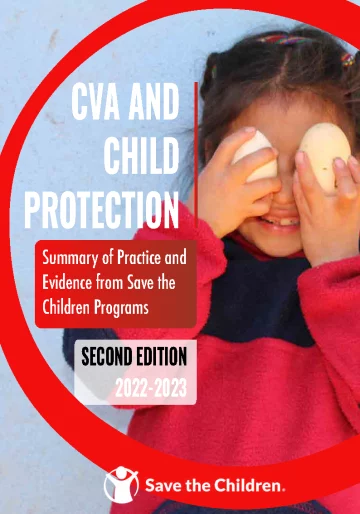
Cash and Vouchers Assistance (CVA) and Child Protection: Summary of practice and evidence from Save the Children programmes 2023 Edition
Report
In an effort to increase global knowledge and learning, Save the Children conducted a global review of twenty Country Offices and their programs in order to assess and highlight the impact that different forms of Cash and Vouchers Assistance (CVA) have on Child Protection (CP) outcomes, to identify...

UNFPA Estudio de caso: la mitigación del riesgo de VBG en la asistencia en efectivo en Iraq y Colombia
Case Study
En 2022-2023, el Fondo de Población de las Naciones Unidas (UNFPA) y el Instituto Mundial de la Mujer de la Universidad George Waimage-20240305162548-1shington llevaron a cabo una investigación operacional en Iraq y Colombia con el objetivo de desarrollar indicadores indirectos para mitigar el riesgo...

Locally Led Anticipatory Action Guide and Toolkit
Guidelines and Tools
How civil society organisations can engage with communities, and collaborate with mandated, technical and donor agencies to localise and scale up early warning and early action
The purpose of the guide is to support civil society organisations to engage with communities and other actors and structures...

Addressing Negative Socioeconomic Impacts of the COVID-19 Pandemic through Social Protection in Viet Nam – Supporting incomes and livelihoods with cash assistance in Dong Nai province
Case Study
In late April 2021, Viet Nam faced its fourth wave of COVID-19, with over 895 000 new cases reported. COVID-19 and related restrictions hindered livelihood options and vulnerable households faced financial stress to cover basic needs. Some of them lost their income and were unable to return to home...

Philippines Cash and Voucher Assistance (CVA) and Child Early and Forced Marriages and Unions (CEFMU): Program Summary and Evidence-Building Infographic
Case Study
This infographic gathers key programmatic data from Save the Children CVA operations in the Philippines between January and August 2023, which aimed to assess and highlight the impact that CVA has on child protection outcomes, with a specific focus on Child Early and Forced Marriages and Unions (CEFMU).

Videos explicativos: ¡aprendamos juntos sobre PTM!
Video
A través de estos videos breves, especialistas de programas de transferencias monetarias de la región nos comparten sus experiencias y lecciones aprendidas sobre comunicación con comunidades; esfuerzos de coordinación para emergencias rápidas utilizando PTM; la mitigación de riesgos de la violencia...

Just in Time: Advancing anticipatory cash in Pakistan
Guidelines and Tools
Cash and voucher assistance in humanitarian response has grown significantly in recent years, with evidence showing that it supports the agency of recipients, reduces harmful coping strategies, supports local economies, and is a cost-effective form of humanitarian assistance.
The use of cash as a form...

Impact Evaluation of Cash-Based Transfers on Food Security and Gender Equality in El Salvador
Case Study
1. Gender inequality is pervasive, particularly in developing countries such as El Salvador, and its potential welfare implications are concerning. In El Salvador, only 45.4 percent of women participate in the labour market, in contrast to 74.4 percent of men. 2. Economic development, gender equality in...

Will our Opinion Matter? Community consultations on the design of multi-purpose cash programmes in Lebanon
Report
Since late 2019, Lebanon has been grappling with a severe economic and financial crisis. The Lebanese lira has lost more than 98 percent of its value, and over half of the Lebanese population is estimated to be living in poverty. The Government of Lebanon and development and humanitarian agencies have...

Ensuring Inclusive Cash and Voucher Programming in Vanuatu
Report
Save the Children is expanding its cash and voucher programming in Vanuatu; helping families to overcome financial barriers to improve outcomes for their children and advocating for investments in a national social protection system.
This report presents the findings of a Gender Equality, Disability...
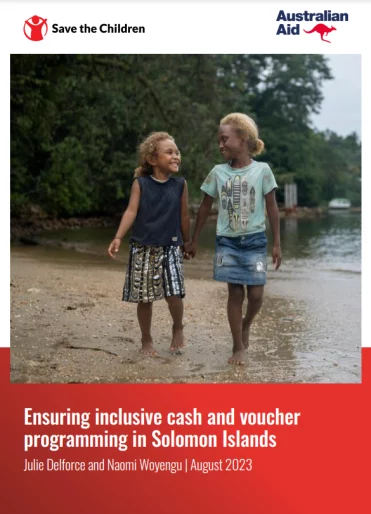
Ensuring Inclusive Cash and Voucher Programming in Solomon Islands
Report
Save the Children is expanding its cash and voucher programming in Solomon Islands; helping families to overcome financial barriers to improve outcomes for their children and advocating for investments in a national social protection system.
This report presents the findings of a Gender Equality,...
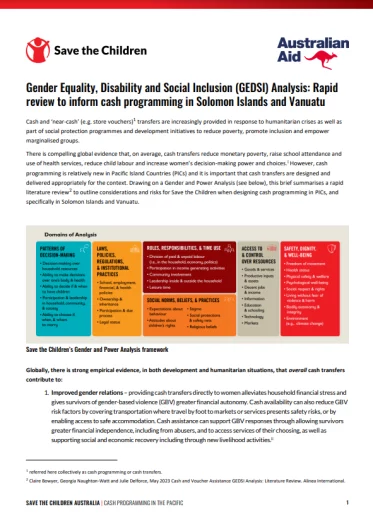
Gender Equality, Disability and Social Inclusion (GEDSI) Analysis: Rapid review to inform cash programming in Solomon Islands and Vanuatu
Report
There is compelling global evidence that, on average, cash transfers reduce monetary poverty, raise school attendance and use of health services, reduce child labour and increase women’s decision-making power and choices. Cash programming though, is relatively new in Pacific Island Countries (PICs) and...

Feasibility study on CVA in Tigray Region, Ethiopia_October 2023
Report
The two years of conflict in Tigray has fueled a large-scale humanitarian crisis and resulted in loss of livelihoods and widespread food insecurity of the population especially Internally Displaced Populations and agrarian communities in the region.
The crisis affected the livelihoods of the...

WVI Cash Roadmap 2.0 – New Avenues – Leveraging, multiplying “Nexus” cash to take children and their families further than imagined
Policy paper
WVI's strategic global Cash Roadmap 2.0 (2024-2027) speaks to the organisations' commitment that amidst polycrises and resourcing constraints, there is urgency to maximise and multiply World Vision's capabilities, assets and cash voucher programming (CVP=CVA) is a powerful tool to do so.
Increasing...

Gender-Transformative Social Protection in Crisis Contexts: Guidance note
Guidelines and Tools
This guidance note is produced under the Social Protection Technical Assistance (STAAR) facility which is funded by FCDO and implemented by DAI Global UK. It was commissioned by GiZ on behalf of the German Federal Ministry for Economic Cooperation and Development (BMZ) to advance the international...

What’s Next for Cash: Mercy Corps’ approach to cash and voucher assistance
Presentation
The brief outlines Mercy Corps' CVA approach & standards applied across our CVA portfolio and sets the direction for CVA in Mercy Corps moving forward.
The approach outlines how CVA contributes to Mercy Corps Pathway to Possibility strategy by focusing on areas that drive impact & sector leadership,...

Building Capital in Crisis: How women in CARE’s VSLAs in Emergencies increase savings and solidarity
Report
Since 2017, CARE has piloted and refined our VSLA in Emergencies model to reach people in need of humanitarian assistance and provide an approach that can reduce long term vulnerability while being more sustainable. In this second report on our pilot research, we provide insights from three pilots in...

Humanitarian Cash Transfers and Intimate Partner Violence in South Sudan
Case Study
Cash-based programming, an intervention commonly provided to people affected by humanitarian crisis, has the potential to affect IPV positively or negatively. This study, however, found no evidence that this cash-based project had any significant effect on IPV. However, the relationship between cash...

“Men have the power to say everything, women don’t.” Women’s perceptions of cash and voucher assistance in Maiduguri’s outskirts
Case Study
In northeast Nigeria, women and girls constitute approximately two-thirds of cash and voucher assistance (CVA) recipients. However, stark gender inequalities in the region make it difficult to hear women’s perspectives. This study aims to amplify their voices and concerns to inform decision-making...


